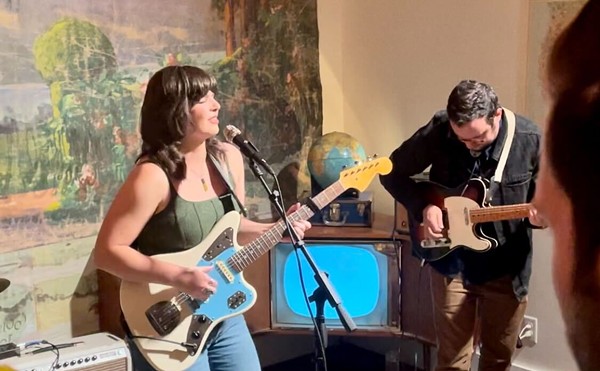Yes, the sold-out crowd naturally went absolutely bonkers when Urge drummer John Pessoni jumped onstage with other members of the still-beloved St. Louis group — including bassist Karl Grable, guitarist Jerry Jost and saxophonist Bill Reiter — and invoked the band's memorable call to (ska-punk-funk-hip-hop) arms, along with a few other tunes: "Tell Me What's Going On," "Brainless," "Open All Night" and "It's Gettin' Hectic." (Contrary to earlier reports, vocalist Steve Ewing was not present.)
This semi-reunion by far drew the most enthusiastic reaction of the night from the sold-out crowd (the venue reached capacity — more or less — just before 9:30 p.m.), which danced, drank, reminisced and generally celebrated the 27 years of the venue over the course of a five-hour-plus jam session.
Had the closure of the venue not loomed over the show, in fact, the concert might have seemed like just another bustling Friday night. Beatle Bob showed up to emcee, wearing a natty suit. Pitchers of beer flowed liberally. Happily drunk strangers talked to me in the restroom. And the audience spanned all ages: Emo kids (and sometimes their chaperones), under-age folks escaping from parents, over-age folks escaping from day jobs, peaceful hippies, people on the prowl for a little loving, people loving the prowl and regular concert-goers dressed up for a weekend-starting night out.
The only clue (besides the TV cameras and reporters roaming around) that something was amiss was the venue's decoration — or lack thereof. The Nights' walls, usually adorned with concert posters from memorable shows (Red Hot Chili Peppers, Ned's Atomic Dustbin, INXS, Stray Cats, Toad the Wet Sprocket, etc.), were shockingly bare and white, stripped of adornment likely so that sad patrons didn't try to take home a souvenir. (Beer mugs were being nicked anyway.) Fittingly, by the time last call rolled around, the blank canvas became a glorified yearbook where fans scribbled memories, thanks and other assorted graffiti to honor Mississippi Nights' legacy.
The high-school-reunion atmosphere extended to the musical entertainment: namely an opening set by the Movers, a mid-1970s-era soul-boogie cover band and a mid-jam interlude by beloved '80s party band Big Fun, whose quasi-reunion included covers of Velvet Underground's "Sweet Jane" and the Ramones' "I Wanna Be Sedated." Although its set wasn't the hours-long marathon of yore, its fans — many of whom sported their vintage, thinning Big Fun T-shirts — appreciated the tasteful mix of celebration and nostalgia: A misty-eyed version of the Rolling Stones' "You Can't Always Get What You Want" was a perfect, bittersweet cover choice that resonated with the crowd, who sang along with the chorus in unison.
Existing bands also showed up to pay their respects. The Schwag executed a suitably tight session of Grateful Dead covers (and were much later joined onstage by Devon Allman), and Greenwheel unleashed an expectedly proficient set of driving modern-rock; less successful was a generic appearance from the rap-rock-punk band Wyccad and a few songs from an acoustic folkie that dragged.
The "jam" part — which featured Fragile Porcelain Mice drummer Mark Heinz, Sinister Dane's Jay Summers, and Reiter and Grable from the Urge (the other two members of the band showed up later) — was hit-or-miss (although this isn't a knock on the talents of the musicians, who had never played together before). A jazzy improvisation meandered on for way too long; but willowy rock vet Jimmy Griffin (King of the Hill, Walkie Talkie U.S.A.) took the mic for an absolutely incendiary, howling take on Led Zeppelin's "Communication Breakdown."
Then again, the sonic diversity of the night (and the varying quality of the music performed) was entirely appropriate for the venue, whose willingness to book adventurous bands made it nationally known and respected.
And more important, on that Friday it became clear that the music Mississippi Nights championed was merely a conduit through which larger memories and emotions ran. Before the show began, booker Tim Weber addressed venue employees. Restless, he stalked around like a grizzled football coach giving a pep talk at halftime, a stub of a cigarette nearly burning his fingers. He joked that he had "given 27 fucking farewell speeches" in the past for the club — but, more tellingly, he asked the question many are still trying to figure out: "Why the hell do people care so much about this place?"
He then answered his own question: "Because it's family."
That's a sentiment co-owner Rich Frame echoed in speeches to employees (and, later, when addressing the entire crowd). Frame often seemed overwhelmed by the outpouring of emotion and gratitude toward him and the venue. And sure, Mississippi Nights was never perfect — and by the end of its run, parking sucked, the genres booked might not have appealed to everybody, and going to the Landing had lost its cachet of cool. But the sense of community it fostered was undeniable — from those that were regulars of the place in the 1980s to today's kids who lined up for hours to snag a prime spot near the stage for their favorite emo-screamo-punk band. And that loss of community is perhaps the thing that St. Louisans both past and present should be mourning the most as the venue closes.
Rest in peace, Mississippi Nights.
Contact the author [email protected]





